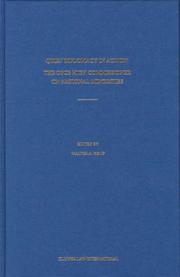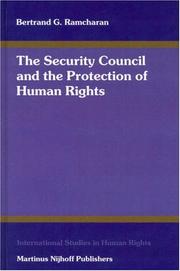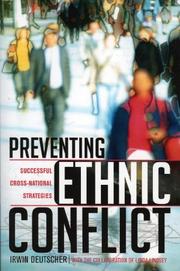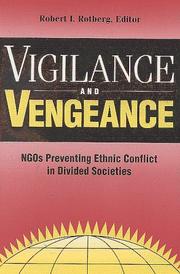| Listing 1 - 10 of 27 | << page >> |
Sort by
|

ISBN: 9789004479050 9789041116512 Year: 2001 Publisher: Leiden; Boston : Brill | Nijhoff
Abstract | Keywords | Export | Availability | Bookmark
 Loading...
Loading...Choose an application
- Reference Manager
- EndNote
- RefWorks (Direct export to RefWorks)
Quiet Diplomacy in Action is the first comprehensive account of the work of Max van der Stoel as High Commissioner on National Minorities for the Organization for Security and Co-operation in Europe (OSCE). Because Van der Stoel worked discreetly, until now very little has been written about his activities. This book takes the reader behind the scenes to explain why the post of High Commissioner was created, what his mandate is, how he worked in practice, and what recurrent themes and issues he encountered. Quiet Diplomacy in Action also gives a detailed summary of the High Commissioner's activities in the more than fifteen countries that he was involved with between 1993 and 2001. Major documents relating to national minorities in the OSCE context are included in an annex. As Michael Ignatieff writes in the Foreword: `Everyone talks about conflict prevention. One of the few senior figures that actually does it is the OSCE High Commissioner on National Minorities'. This book, written in co-operation with Mr. Van der Stoel, gives a unique insight into conflict prevention, minority rights, and the challenge of resolving inter-ethnic tensions. It should be considered a primary resource for all those interested in these subjects.
Conflict prevention --- Diplomacy --- Dispute resolution --- Ethnic relations --- Human rights --- Interethnic relations --- Organization for Security and Cooperation in Europe --- Pacific settlement of international disputes --- Racism

ISBN: 9041118780 9786610468157 141755147X 1280468157 9047403169 9781417551477 9004118780 9789004118782 Year: 2002 Volume: v. 75 Publisher: The Hague New York Martinus Nijhoff Publishers
Abstract | Keywords | Export | Availability | Bookmark
 Loading...
Loading...Choose an application
- Reference Manager
- EndNote
- RefWorks (Direct export to RefWorks)
The human rights idea is shaping the contemporary world. At long last, human rights are being given the prominence they deserve by the organs of the international community dealing with questions of peace and security as well as with development. How is the Security Council dealing with human rights imperatives? What does it see as the place of human rights in conflict prevention, peacemaking, peacekeeping and peacebuilding? How does it address the quest for justice in the face of gross violations of human rights? These and other similar questions are addressed in this book, the first of its kind on the human rights role of the Security Council in the post cold-war world. It is a compelling account of the human rights dimensions of the work of the Security Council.
Human rights --- Droits de l'homme (Droit international) --- United Nations. --- Conflict prevention. --- Human rights. --- Basic rights --- Civil rights (International law) --- Rights, Human --- Rights of man --- Human security --- Transitional justice --- Truth commissions --- Law and legislation

ISBN: 0739109936 9780739109939 Year: 2005 Publisher: Lanham, Md. ; New York : Lexington Books,
Abstract | Keywords | Export | Availability | Bookmark
 Loading...
Loading...Choose an application
- Reference Manager
- EndNote
- RefWorks (Direct export to RefWorks)
Ethnic conflict --- Multiculturalism. --- Ethnic groups --- Minorities --- Conflits ethniques --- Multiculturalisme --- Groupes ethniques --- Minorités --- Prevention. --- Government policy. --- Prévention --- Politique gouvernmentale --- Politique gouvernementale --- Multiculturalism --- Prevention --- Government policy --- Minorités --- Prévention --- Ethnic conflict - Prevention --- Ethnic groups - Government policy --- Minorities - Government policy
Book
Abstract | Keywords | Export | Availability | Bookmark
 Loading...
Loading...Choose an application
- Reference Manager
- EndNote
- RefWorks (Direct export to RefWorks)
The international community is paying increased attention to the 25 percent of the world's population that lives in fragile and conflict affected settings, acknowledging that these settings represent daunting development challenges. To deliver better results on the ground, it is necessary to improve the understanding of the impacts and effectiveness of development interventions operating in contexts of conflict and fragility. This paper argues that it is both possible and important to carry out impact evaluations even in settings of violent conflict, and it presents some examples from a collection of impact evaluations of conflict prevention and peacebuilding interventions. The paper examines the practices of impact evaluators in the peacebuilding sector to see how they address evaluation design, data collection, and conflict analysis. Finally, it argues that such evaluations are crucial for testing assumptions about how development interventions affect change-the so-called "theory of change"-which is important for understanding the results on the ground.
Conflict analysis --- Conflict prevention --- Encouragement design --- Ex-combatants --- Experimental design --- Fragile states --- Impact evaluation --- Macroeconomics and Economic Growth --- Peacebuilding --- Post Conflict Reconstruction --- Poverty Impact Evaluation --- Poverty Monitoring & Analysis --- Public Sector Development --- Quasi-experimental design --- Science Education --- Scientific Research & Science Parks

ISBN: 0815775873 Year: 1996 Publisher: Washington, D.C. Cambridge, Mass. Brookings Institution Press World Peace Foundation
Abstract | Keywords | Export | Availability | Bookmark
 Loading...
Loading...Choose an application
- Reference Manager
- EndNote
- RefWorks (Direct export to RefWorks)
Cohabitation pluri-ethnique --- Ethnic relations --- Etnische relaties --- Groupes ethniques -- Relations --- Interethnic relations --- NGO's --- NGOs (International agencies) --- Niet-gouvernementele organisaties --- Non-governmental organizations --- Nongovernmental organizations --- ONG --- Organisaties [Niet-gouvernementele ] --- Organisations non-gouvernementales --- Organizations [Non-governmntal ] (International agencies) --- PVOs (International agencies) --- Private and voluntary organizations (International agencies) --- Relaties [Etnische ] --- Relations among ethnic groups --- Relations entre groupes ethniques --- Relations ethniques --- Relations interculturelles --- Relations interethniques --- Culture conflict --- Ethnic conflict. --- Non-governmental organizations. --- Social conflict --- Prevention. --- Prevention --- Culture conflict - Prevention. --- Social conflict - Prevention.
Book
ISBN: 9783866493278 3866493274 Year: 2011 Volume: 2 Publisher: Michigan: Barbara Budrich Publishers,
Abstract | Keywords | Export | Availability | Bookmark
 Loading...
Loading...Choose an application
- Reference Manager
- EndNote
- RefWorks (Direct export to RefWorks)
Sociology of minorities --- Peaceful settlement of international disputes --- Polemology --- Armed conflict --- Conflict management --- Ethnic conflict --- Peace-building --- Political violence --- #SBIB:327.5H00 --- Violence --- Political crimes and offenses --- Terrorism --- Building peace --- Peacebuilding --- Peace --- Peacekeeping forces --- Conflict, Ethnic --- Ethnic violence --- Inter-ethnic conflict --- Interethnic conflict --- Ethnic relations --- Social conflict --- Conflict control --- Conflict resolution --- Dispute settlement --- Management of conflict --- Managing conflict --- Management --- Negotiation --- Problem solving --- Crisis management --- Prevention --- International cooperation --- Strategie en vredesonderzoek: algemeen --- Conflict management - International cooperation - Handbooks --- Peace-building - International cooperation - Handbooks --- Ethnic conflict - Prevention - International cooperation - Handbooks --- Armed conflict - Prevention - International cooperation - Handbooks --- Political violence - Prevention - International cooperation - Handbooks
Book
ISBN: 3319778234 3319778242 Year: 2018 Publisher: Springer Nature
Abstract | Keywords | Export | Availability | Bookmark
 Loading...
Loading...Choose an application
- Reference Manager
- EndNote
- RefWorks (Direct export to RefWorks)
By shedding light on EULEX - the EU mission to Kosovo – this open access book investigates the EU’s peacebuilding activities in that country, in the light of the normative power theory in the post-conflict setting and peacebuilding theory. Ten years after the massive engagement of the EU in the country torn by war, the authors critically assess the effects of the EU projecting its normative power – the enforcement of its standards, ‘good’ or ‘bad’ – through the EULEX mission, taking into consideration also the local aspects, so far neglected in this field of research. Inspecting thoroughly the EULEX activities in the police, customs and judiciary sector, the authors reveal that the mission can contribute to a positive change, but only in those cases which do not request a heavy political involvement and broad leverage by other international players (for example in improving standards of work in police and customs). When it comes to the most serious cases of organized crime, corruption and war crimes, EULEX, however, has not been able to address them effectively due to several internal mission’s deficiencies and external factors; the perceived ineffectiveness of EULEX among the local population led to the lowering of trust not only in this CSDP mission, but also in the EU in general. This open access book offers a comprehensive assessment of the EULEX mission, based on two Horizon2020 research projects: IECEU - Improving the Effectiveness of Capabilities in EU Conflict Prevention, and KOSNORTH – The European Union and its Normative Power in a Post-conflict Society: A Case Study of Northern Kosovo (Marie Sklodowska-Curie Individual Fellowship). As such it is an invaluable resource for scholars, students and policymakers interested in security questions in South Eastern Europe and EU external action.
Political science. --- Peace. --- Political Science and International Relations. --- Conflict Studies. --- Coexistence, Peaceful --- Peaceful coexistence --- International relations --- Disarmament --- Peace-building --- Security, International --- War --- Administration --- Civil government --- Commonwealth, The --- Government --- Political theory --- Political thought --- Politics --- Science, Political --- Social sciences --- State, The --- Peacebuilding --- Conflict prevention --- IECEU --- Kosovo --- European Union --- Normative power --- EULEX --- Post-conflict
Book
Year: 2007 Publisher: Washington, D.C., The World Bank,
Abstract | Keywords | Export | Availability | Bookmark
 Loading...
Loading...Choose an application
- Reference Manager
- EndNote
- RefWorks (Direct export to RefWorks)
This study questions the extent to which domestic conflict is influenced by national, regional, and international relationships. It is designed to answer specific questions relating to the effects of neighboring characteristics on a state's risk of conflict and instability: What is the interaction between neighboring conflict and political disorder? Do democratic neighborhoods have different conflict trajectories than non-democratic neighborhoods and if so, where and why? Given that most poor countries are located in poor and conflictual neighborhoods, to what extent is there a relationship between poverty and political disorder in different regime neighborhoods? Using spatial lag terms to specify neighboring regime characteristics and multilevel models to differentiate between explanatory levels, this study reiterates the importance of domestic and neighboring factors in promoting or diminishing the risk of instability and conflict. However, the pronounced negative effects of autocratic and anocratic neighborhoods are mitigated by a growing domestic GDP. This study also finds that democratic neighborhoods are more stable, regardless of income level. Research presented here is unique in its contribution on how regime type is a significant development indicator, which in turn is salient in determining the risks of civil war across states.
Civil War --- Civil wars --- Conflict --- Conflict and Development --- Conflict prevention --- Dependence --- Hazard Risk Management --- Health, Nutrition and Population --- Interdependences --- Member states --- Peace --- Peace and Peacekeeping --- Population Policies --- Post Conflict Reconstruction --- Poverty Reduction --- Rebel --- Refugee --- Services and Transfers to Poor --- Urban Development
Book
Year: 2007 Publisher: Washington, D.C., The World Bank,
Abstract | Keywords | Export | Availability | Bookmark
 Loading...
Loading...Choose an application
- Reference Manager
- EndNote
- RefWorks (Direct export to RefWorks)
This study questions the extent to which domestic conflict is influenced by national, regional, and international relationships. It is designed to answer specific questions relating to the effects of neighboring characteristics on a state's risk of conflict and instability: What is the interaction between neighboring conflict and political disorder? Do democratic neighborhoods have different conflict trajectories than non-democratic neighborhoods and if so, where and why? Given that most poor countries are located in poor and conflictual neighborhoods, to what extent is there a relationship between poverty and political disorder in different regime neighborhoods? Using spatial lag terms to specify neighboring regime characteristics and multilevel models to differentiate between explanatory levels, this study reiterates the importance of domestic and neighboring factors in promoting or diminishing the risk of instability and conflict. However, the pronounced negative effects of autocratic and anocratic neighborhoods are mitigated by a growing domestic GDP. This study also finds that democratic neighborhoods are more stable, regardless of income level. Research presented here is unique in its contribution on how regime type is a significant development indicator, which in turn is salient in determining the risks of civil war across states.
Civil War --- Civil wars --- Conflict --- Conflict and Development --- Conflict prevention --- Dependence --- Hazard Risk Management --- Health, Nutrition and Population --- Interdependences --- Member states --- Peace --- Peace and Peacekeeping --- Population Policies --- Post Conflict Reconstruction --- Poverty Reduction --- Rebel --- Refugee --- Services and Transfers to Poor --- Urban Development
Book
Year: 2015 Publisher: Washington, D.C. : The World Bank,
Abstract | Keywords | Export | Availability | Bookmark
 Loading...
Loading...Choose an application
- Reference Manager
- EndNote
- RefWorks (Direct export to RefWorks)
Iraq was plunged into two simultaneous crises in the second half of 2014, one driven by a sharp decline in oil prices, the other, by Islamic State militants. Since June 2014, crude oil prices per barrel have fallen from around 112 USD to 97 USD in September and 62 USD by December. Given Iraq's heavy dependence on oil as a share of GDP and exports, and a source of government revenues, this decline in prices alone would have hit Iraq's fragile economy hard. In addition, since June 2014, Islamic State (IS) or Da'ash militants extended their influence from Syria into Iraq's northern and western provinces of Anbar, Nineveh, Salahadin, and to a lesser extent, Kirkuk and Diyala. A total of 354,000 families were internally displaced between June and December of 2014 which represents about 2.1 million individuals; and those left behind have been cut off from the rest of the country. The internally displaced persons (IDPs) have sought refuge across Iraq and about half of those who have crossed governorates boundaries were settled in Iraqi Kurdistan.
Conflict --- Conflict Prevention and Post-Conflict Reconstruction --- Economic Forecasting --- Economic Management --- Economic Statistics, Modeling and Forecasting --- Employment --- Income Distribution --- Inequality --- Inflation --- Labor Market --- Macroeconomics and Economic Growth --- Poverty --- Poverty Monitoring & analysis --- Poverty Reduction --- Poverty Strategy, analysis and Monitoring --- Pro-Poor Growth --- Social Dev/Gender/Inclusion --- Social Protection and Risk Management --- Social Safety Nets/Social Assistance
| Listing 1 - 10 of 27 | << page >> |
Sort by
|

 Search
Search Feedback
Feedback About UniCat
About UniCat  Help
Help News
News